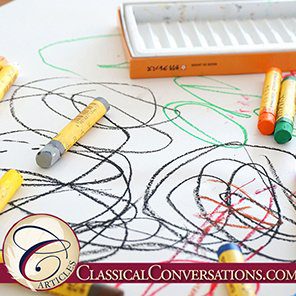by Elizabeth Morales
“Beauty is truth’s smile when she beholds her own face in a perfect mirror.”
~Rabindranath Tagore
The pursuit of classical education is to seek the good, the true, and the beautiful. I heard this saying all through my high school years in Classical Conversations. The idea seemed nice, but I did not always understand it. How could math be beautiful?? I am a born and raised “CC kid,” K4–12th grade. However, I would categorize myself as an artist and performer, not a scholar. I doodled in class, despised math with my entire being, possessed no appreciation for reading, procrastinated whenever possible, preferred giving a speech over writing a paper, and would much rather be dancing than doing school. Education only peaked my interest if I was learning something I considered fascinating, or I was memorizing. I do love memorizing, but I did not choose to do Memory Master until my final year in Foundations. Writing has always proved a struggle.
Some of this has changed, but not much. I once longed to be eloquent with words, creating beauty with ink and letters. I have come to realize that I prefer turning words into movement or a picture or a sound. However, during a recent hike in the mountain beauty of Blowing Rock, North Carolina, my sister, mom, and I struck up a conversation about the impact classical education can have on an artist who is not academically inclined. That conversation inspired this article. The fundamental theme throughout is when one looks at the world through the lens of God’s perspective, one begins to see more things as good, true, and beautiful. And things one already views as such become more so.
Dreamworks’ 1998 film Prince of Egypt debuted the song “Through Heaven’s Eyes.” Every time it plays, my sister Meghan exclaims, “Oh my word! This is education!” Upon closer consideration, I understand what she means. Classical education often receives a bad rap for putting an emphasis on things most students will never use; it seems like a waste of time. It connects things that, at first glance, hold no connection. However, when approaching education from a Christian perspective––which strives to be synonymous with God’s perspective––it forces us to ask questions such as “How does God see math?” That, my friends, is a dangerous question, because to acknowledge God’s love for math, His pleasure in using it, and His decision to give us the understanding to learn it, is to turn math into more than a mere school subject. It is now the creation of a divine Spirit who bestowed it on His beloved as a gift. That changes everything. This question can be applied to any school subject. God wove order and reason into our world; He loves logic and math. God spoke atoms, chemicals, plants, pumping hearts, and gusty winds into existence; He loves science. God gave men words to write and speak; He loves literature and language. This list continues. When we choose to view every aspect of our world “Through Heaven’s Eyes,” we suddenly see everything as different and more valuable.
Pursuing the vision of God reaches into the world of art as well as academics. Education should never squash the vibrant lens of an artist in the name of school. If anything, I believe my eye for beauty has grown as my appreciation for God’s passions has expanded. If our hearts are to resemble His heart, we cannot brush aside certain subjects for risk of losing vitally important perspectives in the Christian walk. When we practice seeing more of our world “Through Heaven’s Eyes,” we can view everything, even people, as with the heart of God, putting aside our preconceived notions of fellow humans. We see peoples’ hurts, their joys, their longings, their needs, and hopefully feel alongside them. A richness comes over our lives and transforms our hearts as only God can do. Our mind and heart are connected, therefore the transforming of minds should lead to change in hearts: “Do not be conformed to this world, but be transformed by the renewal of your mind, that by testing you may discern what is the will of God, what is good and acceptable and perfect” (Romans 12:2). An artist can now see the fog over mountain trees, the sun glittering on water, and the deep purple of an iris in richer ways than before. New perspective summons a deeper experience with what is taken in and what is put out.
Romans 12 calls into discussion another benefit of classical education for the creative: Those with an artistic orientation often take information they are given straight to the soul. They cannot help but feel and feel deeply. Classical education does not discourage this but instead equips students with the skills to take the knowledge and the feelings and sift through them with logic and reason. It teaches students to think critically and discuss ideas with the knowledge that ideas have consequences. May artists feel deeply, but may they always test to see what is good and acceptable and perfect.
To revisit the quote that opened this article, it is necessary to distinguish the connection between truth a beauty. Discussing and striving toward Truth show us what God sees as beautiful––not the world’s vain pursuit of it. I believe that Truth, whether learned in school or in God’s Word, is beautiful. Likewise, I believe that the beauty we see around us, in creation and in people, is Truth. This is because they both flow from the same Designer of all that there is. Therefore, “Beauty is truth’s smile when she beholds her own face in a perfect mirror.” We must simply train our eyes to see the reflection. This applies to all, even the artsy CC kid.
~ Elizabeth Morales




